Counterterrorism in Afghanistan; US Deception in Talks with Iran, Russia
DIDPress: RealClearWorld, in a recent analysis, argues that amid the Trump administration’s efforts to reach a form of agreement with Russia and Iran, cooperation on countering terrorist threats originating from Afghanistan is being positioned as a bargaining chip in negotiations.

Afghanistan as a Diplomatic Card
Four years after the U.S. withdrawal from Afghanistan, the country is no longer a top foreign policy priority for Washington. However, in light of the Trump administration’s renewed push to engage with Russia and Iran, counterterrorism cooperation related to Afghanistan could serve as a “carrot” in diplomatic discussions.
The Role of the Terror Threat
Despite earlier projections that Afghanistan would become a terrorist haven post-withdrawal, no major threats have emerged against U.S. soil so far. However, for Russia and Iran, the terrorist threat—especially from ISIS-Khorasan (ISIS-K)—is very real and immediate. The group has claimed responsibility for major attacks targeting these nations and even China.
ISIS-Khorasan: A Regional Threat
ISIS-K is composed of militants from across the region, including Chechnya, Uzbekistan, Tajikistan, Afghanistan, and Pakistan.
The group has carried out several deadly attacks, including:
• Concert hall bombing in Moscow (March 2024): Nearly 150 killed
• Memorial ceremony bombing in Iran (January 2024): 80 killed
• Previous attacks on Shia shrines in Iran (2022 & 2023)
Security Developments Post-U.S. Withdrawal
After U.S. exit, the Taliban filled the resulting security vacuum and have conducted counterterrorism operations. However, the apparent decline in ISIS attacks may indicate a shift in the group’s strategy toward transnational operations.
Despite this, the Taliban face severe economic and humanitarian challenges, limiting their capacity for full territorial control. Meanwhile, Pakistani military operations targeting Tehrik-i-Taliban Pakistan (TTP) in eastern Afghanistan have further complicated the regional security landscape.
Regional Responses
• Russia: Despite longstanding distrust of the Taliban, Moscow has offered assistance in combating ISIS-K as part of a broader policy to normalize relations.
• Iran: Since 2023, Tehran has engaged in informal security cooperation with the Taliban to thwart ISIS-K attacks.
A Diplomatic Opportunity for the U.S.
The United States could leverage its intelligence capabilities to identify and prevent terror threats and offer this expertise as a form of cooperation to Russia and Iran. While such intelligence-sharing should remain a secondary issue in broader talks, it could signal Washington’s willingness to de-escalate and engage constructively.
Notably, the U.S. had already shared warning intelligence with both Russia and Iran prior to the 2024 attacks.
Strategic U.S. Interests
• With Russia: Reducing tensions amid nuclear risks and the ongoing war in Ukraine.
• With Iran: Reaching an agreement on the nuclear program, encouraging foreign investment, and preventing regional conflict.
Conclusion
The United States could use the shared threat posed by ISIS-K as a diplomatic tool to engage Russia and Iran. Given the real and present danger the group poses to both nations, intelligence cooperation on counterterrorism could lay the groundwork for de-escalation and broader regional stability—aligning with both U.S. strategic interests and global security goals.